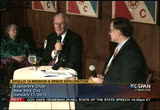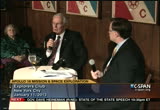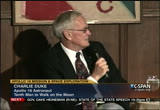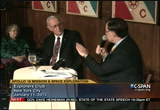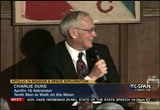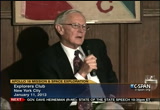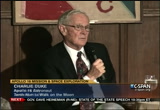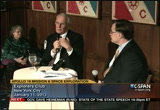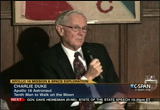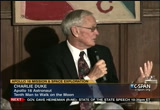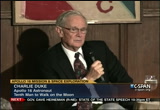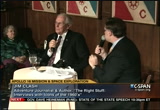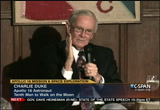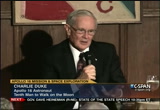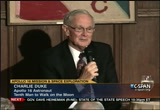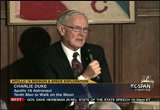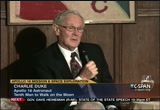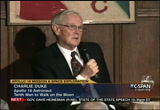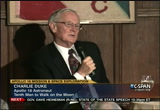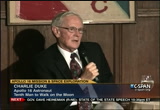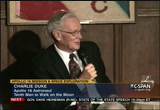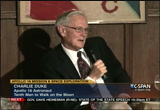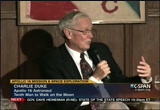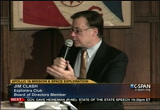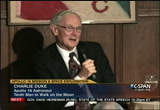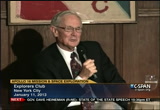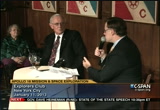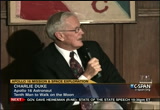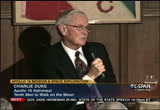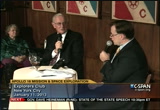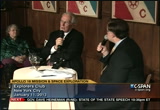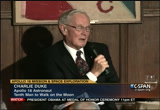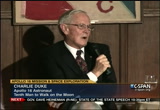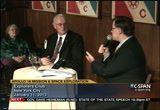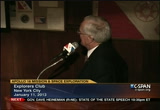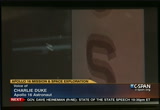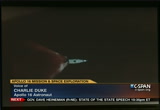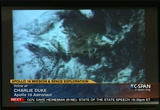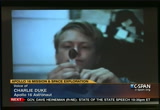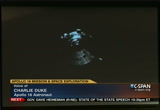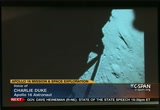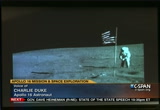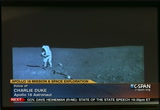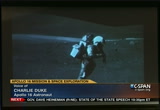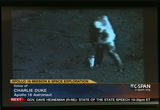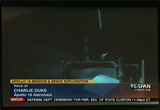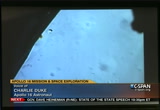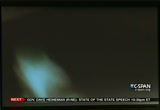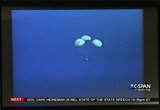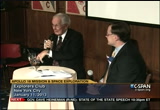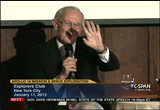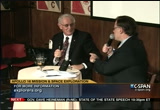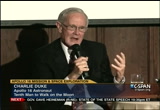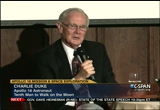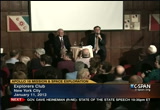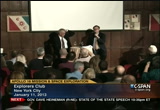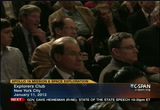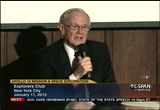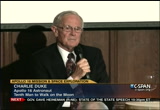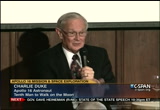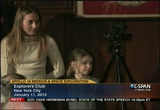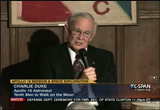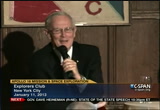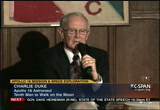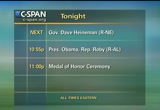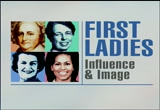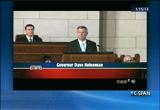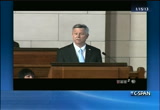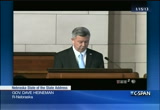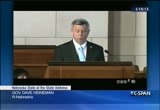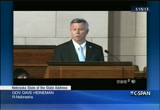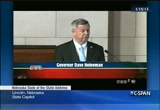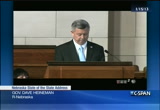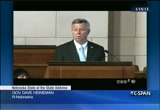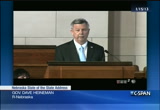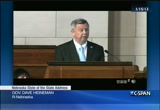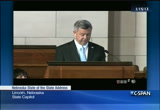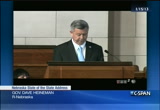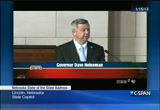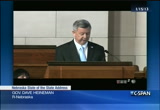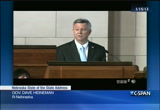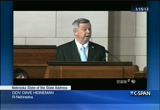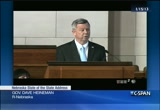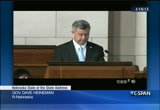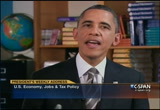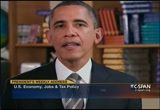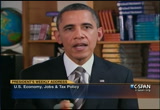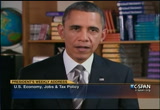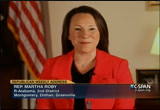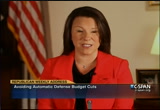tv Apollo 16 Astronaut Charles Duke CSPAN February 16, 2013 9:30pm-11:00pm EST
9:30 pm
ground. >> bills were the first words on the moon. -- those with the first words on the moon. >> they were. the first steps were neil. >> this is a good segue into neil. he was one of our most esteemed members, passed away unexpectedly this summer. you were at the memorial service. >> i was at the funeral service and does cincinnati. -- funeral service in cincinnati. i missed the memorial service. >> tell us what the was like at that service and what was neil armstrong like as a man and as an astronaut? >> the funeral service was in cincinnati, outside under a covered tent.
9:31 pm
mostly family and astronauts and close family were there. we got to see a lot of the apollo era astronauts. bob jacobs, the pr that represented nasa. it was more of a member is of and a from his sons couple close friends. the eulogies were mostly about his humility. that is what i remember most about neil. one of the most humble guys i ever met, most self-effacing, never bragged. never thought about looked at me, i am first on the moon.
9:32 pm
and it probably the most talented guy i knew as far as pilot skills go. >> you were if prior -- you were a fighter pilot. >> right, and so was he, in korea. then he got out of the navy. so he was an accomplished pilot when he came to nasa. i think if anybody should have been first on the moon, it was neil armstrong because he had the skill and the humility to carry that load. >> we talked last night at dinner. when you were flying at the lunar module down, commander is on one side and the other guy is on the other side. it makes it easier for one person to get out first. talked-about -- talk about that.
9:33 pm
>> who's gonna be first out? the lunar module pilot is on the right side as the face forward. the commander is on the left side. and you are standing. it takes a couple hours to get to take up -- to get suited up. and we get suited up and de- pressurizing the module. the guy on the left has to get out first and you reach down and unlocked the door. it swings to the right tree so the guy on the right is trapped behind the door -- it swings to the right so the guy on the right is trapped behind the door. >> there was some discussion
9:34 pm
about that. >> buzz said maybe we should swap places and nice to be out first but that cannot happen. on our flgithight, john said i'm not swapping with anybody. >> i would not either. it was four years ago that apollo 17 glass footsteps on the moon -- apollo 17 put the last footsteps on the moon. i remember sthem saying the put out a plum and reeled back a lemon. >> we were disappointed that they canceled the last 3 missions. we had space craft ready to go.
9:35 pm
18, 19, maybe 20. but there were at least two more flights. but the political situation was changing. while john and i were on the moon, they announced the shuttle program. we had just salute the flag. mission control said congress just voted the funds for the space shuttle program. we were excited about that. we thought it was going to be a good program. >> but you did not know that was going to be the end of apollo? >> yes, we did. they had already canceled last two missions. so we knew we were going to be the next to the last. when gene gets back, there was still a lot of activity. we have three skylab missions we were training for the and the russian mission.
9:36 pm
they use that the last of the command module's. they moth balled 3 saturn 5's. they decided to cancel the last ones and spend the money on space shuttle. for over 30 years, since 1981- 2011, the shuttle was a tremendous program save for the two accidents with colombia and the challenger. it accomplished a lot. i thought that program was well worth it, what we spent. and we were building the space station which is now up there and can be if it is funded and utilized correctly, a great scientific base in space.
9:37 pm
but my disappointment is is now that the shuttle is over, we have no real mission. we have a spacecraft that is like apollo on steroids and that the nasa spacecraft. demi have dragon, -- then we have dragon, which is spacex, commercial, and a few others. the mix is changing. nasa has been focused more on the unmanned. mars rover . i was disappointed to see the consolation program canceled -- to see the constellation program cancelled. part of it was resurrected. the orion part that lockheed is building.
9:38 pm
there is a debate among us old astronauts. should we go to the moon? the debate is should we go to the moon and develop a moon base similar to what we have in antarctica, which i think is a good idea. and there you can develop systems as spacecraft that would be a long duration which you will need for mars but you're close enough so you have some help. second and a half delay in speaking hello, houston from the moon. by the time they hear and speak back, it is 3 seconds. mars, it is a different deal. >> what is it, and eight minute delay? >> i am not sure. it is a long delay. go buzz, he said let's
9:39 pm
colonize the robot, one of the mars moons. i do not think we -- i cannot think i will be around when we finally get a mars mission. we have to develop radiation. >> new things have to be sent into space. >> a lot of news things -- of new things. the technology from that then goes out and stimulate the world economy like apollo and early space programs stimulated the economy of the world. i got an iphoneo n my hip -- iphone on my hip that has 2000
9:40 pm
times the memory of an apollo computer. can you imagine? the space station guys, they have texts, skype or something up there. and they're all on their laptops. it boggles your mind what is going on there technologically. >> today you could probably tweet what is going on on your flight. i know and a first light and only slight, -- first and only fightlight, on the way back to earth, you got to do spacewalk. >> it was totally different. a different experience. as i described being on the moon, it contrasts the gray
9:41 pm
lunar surface with the blackness of space. people ask me what the the earth like from the moon? i said i cannot tell you because i landed in the center of the moon which took the earth directly overhead. in an apollo space suit, it is like being in a fishbowl. you move your head but the helmut does not move. so i did not get to see the earth very much from the moon. but in lunar orbit, you come around from the backside and there is the earth rise. we landed at a half moon. when you viewed the moon from the earth when we were there, you would see a half moon growing towards full. i watched the earth gets
9:42 pm
smaller and smaller because of was going towards the new phase. as we come around, it's a couple of days but you could see -- it took a couple of days but you could see it changing in shape. it was a blue and white marble sitting out there in the blackness of space. on the way home, on the eva, you are in 0 gravity. mattingly was the first out and then i came outside. my job was ticket -- my job was to make sure he was not getting in trouble so i monitored his movements and stuff. >> this is a space walk? >> he is way back down at the
9:43 pm
end of the service module, retrieving some experience. as i floated out, i got up over the hatch and 180,000 miles away was the earth. it was a thin sliver of blue and white. that was all you could see. then i rolled around and up here, about 50,000 miles away, was this enormous full moon. it was overwhelming. it was just huge. everywhere else to look except for the sun, it was black. there is no night in space. the sun shines all the time so you never see any starts out there. so unlike star wars and whatever science fiction movies,
9:44 pm
not true. >> ufo very- mitchell is outspoken. he believes in ufo's. your own opinion? did you ever see anything out there that you could not stand -- they could not understand and do you believe there is other intelligent life in the universe of the mankind? i> on the ufo's, in my career, have never seen anything. that does not mean they are not real. rememberpollo, i don't anybody telling eni stories of -- telling any stories of siting anything. ed mithcell got a scientific organization which is basically
9:45 pm
trying to scientifically prove the existence of god. paranormallot of stuff. but the existence -the- i do not know if there are ufo's or not. as far as life goes, i do not know whether there is or isn't. depends on the point of view you take. my personal opinion, it is probably not but i am the only one in the ashgabat office that has that opinion. that is just an opinion -- i am the only in the astronaut office that has that opinion. that is just an opinion. my opinion changed over the years when i got back from the moon. i told my wife if i ever get picked up by a ufo, don't expect me to come home.
9:46 pm
she did not like that. know.don't if there is, i hope we find it soon. >> i know you are a devout christian now. your wife was first to go that way. so obviously you do believe doin god. can you talk about, did that happen as a result of your travel in space? when did it happen and why? >> it was not a results of my space flat. i had grown up into a christian home and i believed it until god. -- i believed in god. but it was only a sunday relationship. it was not something i recall a
9:47 pm
personal relationship where you pray regularly and saw god;' -- where you saught god's will and direction. women got back from the moon, it was the ultimate experience but i did not feel close to god on the moon. i was not searching for god. i did not think i needed god anymore than i had. yet i was faithful in a church attendance. we took our kids. but my personal life was falling apart. >> this was after you got back in the 70's? >> yeah. dottie was -- she had gone from depression to suicidal thoughts. some people have come to our
9:48 pm
church and shared their love of jesus. she said i've tried everything but got so she said i will try god. after the weekend, harper was god, if you are real -- after the weekend, she said god, if you are real, i will give you my life. and i watched her change over the next few months from sadness to joy. i was there that we can but i wish changing careers. i was leaving nasa. >> you took note. >> it was just for her. 2 1/2 years later, i will -- i was at a time where i saw such a transformation in her in such a love that i said this has to be
9:49 pm
real. so i've been this is -- so i made the same decision and watched my personal life be anchored and i began to build our relationship on christian values, christian principles. that is where we have been for the last 35 years. >> how many free get -- many frequent flier miles you have got all these places? >> last year, i got 265, 000 miles on delta and 3.3 million miles on dletelta. that should be worth a free flight. >> we flew charlie in here coach
9:50 pm
and he upgraded with his miles. >> actually, i am a diamond. so they give it an upgrade if they have a seat. anyway, my son flies for delta so i try to support them. my youngest son is a fighter pilot and flies for the texas air guard. he is a delta pilot. he tried to be in after not -- to be an astornaut in his 20's but he could never get to a test pilot school. so i told him if you want to fly the shuttle, you got to get this test pilot school. >> what do you remember when the challenger exploded just after
9:51 pm
takeoff? what was your reaction? >> i was in malaysia on a trip. i grew up in the south carolina. i got this phone call from an editor of the state paper in columbia, south carolina, and said would you comment on the accident. i said what accident? he said 12 hours ago, the challenger lifted off and blew up 78 seconds after. after lift off. we were in a remote section of malaysia. so we did not have any radio or daily newspaper.
9:52 pm
he told me about this and i was stunned. i met some of the -- a guy from my home state, ron mcnair, who was killed. and we were close friends. to have seen such success with shuttle and then have this disaster, i was stunned speechless. it was a very sad time. i made some statements to the newspaper but that was that. >> you were not going to go back up and fly again. i asked some astronauts whether that somethem. -- whether that affected them if richard branson said i will
9:53 pm
give you a flight, would you take it? and what would you be looking for? >> sir richard has the virgin galactic. it is a rocket powered airplane that carries a pilot and four passengers up to 400,000 feet and you have 5 minutes of 0 gravity and you come back down again. i think he's going to have success. on the list. i have a friend on the list. if i had that right -- that ride, i met him a couple years ago and volunteered to go. but we had a conference on his island in the caribbean. anyway, he did not offer me a free ride, so. [laughter]
9:54 pm
it is a little pricey. by a lot of people think it is worth the price. i think it will be a commercial success -- but a lot of people think it is worth the price. i think it will be commercial success. but my advice, do not unstrap. the view out the window as the most spectacular part of the whole thing. you will see the view will be incredible. >> so forsake the weightlessness for the view. >> maybe split it up. those passengers are going to be having so much fun, if everybody floats around, to get those -- it's like hurding cats to get
9:55 pm
them back in their seats. theou're the chairman of after not scholarship foundation -- of the astro naut scholarship foundation theory -- scholarship foundation. i asked neil armstrong what the american dream is today. he said to me it seems nothing more than sitting back and being entertained. that was a harsh statement by great american hero. you are mentoring and helping out with young people. tell us what you think about the state of youth today and science and what does the scholarship foundation do? >> i think we are in some
9:56 pm
trouble as far as young people, motivating them for science, engineering, technology, and math. so many of our students are not being motivated. part of the astronaut scholarship foundation is to keep us number one in science and technology. we are not there now. we are in the middle. i just got an honorary doctorate degree from clemson last december and a ph.d.'s were given their degrees first street i think there were 28 people that got computer degrees and 18 of them were
9:57 pm
asian or chinese. if we can motivate them to stay, that's a good deal. but i don't know how the immigration stuff works. the idea of the scholarship foundation is we give 28 $10,000 scholarships away each year to a group of schools that we have affiliation with. the school picks their top two candidates in engineering, bioscience, computers. they are juniors and seniors in their respective universities. they send them to us and we have a committee headed by a shuttle astronaut. our committee picks one of the
9:58 pm
two and we give them the $10,000 scholarship. it has had a tremendous effect on the universities and the graduates who have received are scholarships are now seeing in the importance of that the dead of their careers so they are contributing in to our funds. -- the importance of that in their careers so they are rigid and into our funds. -- they are contributing into our funds. the president's commission made a statement -- if we do not change, we will lose our leadership in technology.
9:59 pm
this club has the same goals to motivate young people, that interest them in science and math. the engineering disciplines. it is important for our country. you do not build an iphone without some talent in computer sciences. we have enjoyed the benefits of it. we need to keep motivating the kids.' hopefully our economy will expand said that once they get these degrees, they will have opportunities to apply it in a commercial venture. >> how long have you been a member and why did you enjoy and the explorers club? >> i joined in the early 1980's. a man in houston said you need to join the explorers club and i
10:00 pm
had known about it for a long time. i just never got around to it. it is an organization of explorers and then applying what they learned in the varies fields. there's some -- a great and famous people that we're following in the footsteps of. i thought this -- i'm going to explore and i want to be a member of this club. i send my dues in every year and i support it. so it's a pleasure being here and having an opportunity to speak -- first time i've ever been in this historic building and to have the opportunity to be here is really special so i
10:01 pm
thank the club for inviting me. >> we thank you for being here. we have one me question then we're going to watch your footage and open it up for the audience. you've been asked every question in the world, what is a question that you wished you were asked more often but you don't get asked? that's a tough one. the question -- >> that you wish someone would ske you more often. you're used to the same old -- what did the moon feel like? >> occasionally i get the, why did we go to the moon? what benefit was it? why did we spend so much money on the moon? that doesn't come often but people need to know it was a god investment. business -- good investment.
10:02 pm
business schools have done studies on apollo and it was and premen douse return on investment. put i simply, over a glass of wine or something, when someone asks me that question, why did we spend so much money on the moon? we did not spend a dime on the moon it was the united states of america and we had 400,000 people ployed. look at what you're enjoying from the technology that has spread the whole economy and the my of the world. >> and we won the cold war. >> we did. >> that was a big part of it getting to the moon first, for whatever reason, after that the cold war changed. so we did get a lot out of it. that is a great question. i would like to let charlie talk a the real deal. >> then we're going to have
10:03 pm
questions from you guys. ok. >> thank you. >> thank you. [applause] >> this is a 15-minute video that i put together. it is excerpts from a d.v.d. i did called "moon walker." i produced it about 20 years ago or so. what you're you're going to see is apollo 15 from liftoff to splashdown. this version is silent so i will narrate it for you. we're getting our little mack cued up back there -- mack --
10:04 pm
mac queued up back there. you will see the liftoff, that was the biggest rocket ever launched. it took us -- all the apollo moon missions were on the satellite 5. it is 360 feet all the and weighed six and half million pounds. the engines, there were five at the bottom they were produced and seven and half million thrusts. the fuel was liquid, very cold. as the vehicle lifted off the vibration was intense and we're shaking off a couple of tons of ice. so those big chunks of white stuff is ice falling off the exterior of the vehicle. we're in the top, of course. the little spike you see at the
10:05 pm
top was the launch escape system. so if we had a problem with the vehicle we could ignite that rocket and it would jerk us off then we could open the parachutes. the first stage is the center black line down. for us, it lasted 2:41 and it took us about 8,000 miles an hour, around 35, 40 miles altitude. we burned up four and half million pounds of fuel in the first 1:40 through the big enjines. there are vehicles still on display, there's one at kennedy and one in alabama and one at the johnson space center in houston, the remaining vehicles. the vibration was intense on the first stage. it is just shaking like crazy
10:06 pm
from side to side. i got nervous. i did not think it was going to vibrate that much. my heart beat was 144 per minute. the flight surge -- surgeon says you were really excited. i said what was john's he said john's was like 70. you could see who the cool one was. [laughter] this is the atlantic ocean. florida is the brownish looking piece. what you see at the bottom is california, to the right is baja, california. spin around and you see mexico, central america. back around to the dark area is the gulf of mexico, the rocky
10:07 pm
mountains, the sierra, nevada. to the left that is the arctic circle and this is the view we had on the way out, element the first earth. this is our command module. we're on our way to the moon. the windows are uncovered, we can see out. a little bit of zero gravity stuff. we did this to show you that you better keep track of things, something is going to float away. you lose your pen kill your spoons, -- pencils, your spoons. he lost his wedding ring. i'll tell you that story later. this is one of the food bags. this is actually a shuttle demonstration and this is grape juice. you see what liquid does in space, it takes a -- that is a
10:08 pm
flying banana. we didn't have any bananas on apollo that was a shuttle. they had real food on the shut. they had a lot of room. this is four days later, we're at the moon. you look at the top of the lune far model. you see the little white circle that appears. that is the tracking light. right above that is the door which you open when you get on the moon, crawl out backwards on your hands and knees. crawl out on the dark porch, down the ladder, and out on the foot bad. the mood yule weighed about 38,000 pounds. from the door to the foot pad was about 15 feet to give you some sense of scale.
10:09 pm
this is the view of the area near our landing site. about this time, there was a problem reported so we abborted. you can see the earth in the background. now, we're on a descend. we're one mile above the moon. we recognize the two large craters. now we're about 40, 50 feet off the moon. john has picked out a landing site. you see we start blasting out the moon dust. the shadow comes in the window. the camera is in my window. as we touch the moon, the light comes on and we shut down the engine and the dust clears instantly because there's no atmosphere to cause if dust to swirl like sand storms on the earth. notice the contrast between the
10:10 pm
shadows and the sunlight. very sharp, distinct shadows up there because of the brightness of the sunlight. it was brilliant up on the moon in the sunlight. so you had two sun viesers down. the gold one you see, there i am. we didn't have digital cameras in, we had cameras in film. i'm putting a film canister on this camera. it had dust on it so i blew the dust off, of course that didn't work because you can't blow dust off with a helmet. i felt like an idiot when i realized what i was doing. [laughter] that's me on the right. john comes out to salute the flag. the flag is standing out because not because of a 40 knot wind but there is a curtain rod
10:11 pm
holding it out. i said give me a big navy salute, john. he gives a jump for joy then we swap places and i get my picture taken. this is coming up my most embarrassing moment. i'm the guy that disappears on the right. john is working on an experiment and a tv camera follows me out and on the right side, that big bundle there is $10 billion worth of experiments and as i bounce across they fall off. [laughter] i was embarrassed. i said oh, no, i lost them all. then i got embarrassed because the tv was pointed at me. i couldn't lie. it turns out they were not damaged at all. i reattached them and we redeployed them. here's john on the back of the
10:12 pm
rover. watch his feet as he hits the moon the dust gets kicked up but falls back quickly. if you look away from the sun it was bright gray, if you look towards the sun it is dark gray. one we returned, it was a core sample. that is the central station, unfortunately, john got tangled up in one of the cables. here's the car, i'm taking a picture of what we call the grand pre. this is the only footage where you can see the whole car on the moon. it was an amazing machine. it had an electric motor. this is what happens when the experiment doesn't work right. down i go. now i have to get up.
10:13 pm
this is your get up deal on the moon. push up, that didn't work. let me try again. almost. [laughter] one more and i'm up. [applause] we look like -- we started out pure white suits and we looked like mr. clean but the lunar dust is so fine it gets in the fabric of the suit even though it is so tightly woven so we ended up gray in the suits. we lost the fendser on the car and the driving rained moon dust on us. but the suits performed flawlessly even though outside they were bad. here i am trying to sample a rock by myself. i wasn't very successful. i wouldn't have made it as a
10:14 pm
wide receiver in the nfl. i'm more careful. this time i slowly pitch it up and catch it but drop the bag i'm putting it in. we have plenty of bags so there's one of the bigger rocks. the biggest one we had was bigger than this room. it was like 90 feet long and 45 feet all the. we called it house rock. with our little hammer we were able to pound some of that rock off. we collected about 213 pounds of lunar rocks. ok, here's the high jump. that's john just beginning to jump. that's me right there. there i go and i go over backwards. [laughter] and that was scary. that backpack breaks i'm dead. and fortunately, it held teeng
10:15 pm
john helped me up and i will appear in just a moment. mission control was exceedingly upset with that maneuver. my wife and mission control saw that and my mom and dad. we left the car up there. there were three cars on the moon, so if you want an $8 billion car with a dead battery, i can tell you where to go. picture of my family i left on the moon. on the back of it we signed it, this is the family of charlie duke who landed on the moon. the temperature was 230 degrees fahrenheit so the photograph did not last long. we left the camera going so they followed us on liftoff. that was apollo 17 because they tracked them farther than they did us. so i snuck that in.
10:16 pm
here's our final ran da view with our t command module. we eventually separated from that part and it crashed into the moon. we're heading home. the last time i looked at the computer before reentry we were going through 38,900 feet per second. we hit the atmosphere probably 26,000 miles an hour. you see the white hot fire ball outside the scrace craft and now it is fading away because we slowed down. reentry was seven and half. as you hit -- it is very critical because if you hit wrong and you don't maneuver wrong you can bounce out, skip out is what we call it, then you're lost in space. fortunately, all of the apollo
10:17 pm
behaved correctly and the auto pilot flew a precise projectry. so we landed within the a mile of the intended landing spot in the southern pacific. the parachute starts deployment about 23,000 feet above the moon then at 10,000 feet the main chutes come out. if you want my opinion, the prettiest site of all apollo are those parachutes. if you don't have them you're dead. here's the helicopter. this picture is taken from another helicopter. by the time we flew there was no quarantine. the first three missions that landed, they had quarantine after the flight because we didn't want any strains or whatever wiping out the human race. that was nasa's idea.
10:18 pm
but by the time we flew they realized there wasn't anything. that's our 11-day mission with the splash down. i hope you enjoyed it. thank you. [applause] >> that was something to have him take us through that. >> what we're going -- let me finish this story. about the wedding ring. he lost his wedding ring, he washed up and he stowed it in the side of the spacecraft. when he got ready to finish up the ring floated out of the pocket. the ring was in the spacecraft somewhere but we could not find it. on the fourth day, we arrive on the moon, the fifth day we land,
10:19 pm
on the ninth day we're coming home and he's still looking for his wedding ring. so we have this space walk or e.b.a. on the way home. about an hour into this, i'm back inside looking out of the hatch and he's 10 feet away with his back to me working on some biological experiment. i'm watching this butte fortunate view and i see -- beautiful view and i see this gold glimmer. i see his wedding ring floating out of the door. i broke loose and i reach for it and i missed it. it just floated out the hatch. it was lost in space. we're all moving true spice at 3,000 miles an hour so there is
10:20 pm
no resistance in space and the only differential velocity, if you will, is this out gassing pushing the ring out the door. it eventually hit him in the back of the head. >> did you tell him it was coming? >> he was so busy that i did not say anything. there is a round ring and a round helmet and then lost in space. it took a bounce and it floated back into the hatch and i grabbed that beauty. >> that is a great story. i never heard that one. last night you told me a story and i want you to repeat it. it has to do with an experiment and water. >> jim asked -- how was the congeniality of the crew? how did they pick the crews?
10:21 pm
we did not have any sickological testing to make sure -- psychological testing to make sure we get along. so what if, what if, i was an optimist, let's press on we'll get it done. but with all the personalities it balanced everything out. the only big argument we had was that he gets this apollo space suit helmet and his idea was to fill it with water to see what would happen with water with zero gravity. john said bad idea and the commander said -- if this gets out we can short out the
10:22 pm
spacecraft. so john cast his 40,000 votes and we didn't do that experiment but that was the only little discussion we had in the whole mission. >> did you drink tang? >> we drank four to five tang. they laced it with potassium and other minerals. it was that dehydrated stuff and you added water and it tasted like tang. unfortunately, the potassium they put in it also acted like a laxative. i won't say oh-uh but from the 11 missions we hold the number of poops in space. >> you guys got it on the record. listen, we're going to open it up to the audience for
10:23 pm
questions. but first, i want to auction off something i have here. this is the explorer's club flag and charlie duke has signed it. if anyone is interested, i'm going to start the bidding, i'm going to bid $100. is there anybody out there that will bid more than $100. how much? $150, the bid is $150 back there. the bid is $200. who has $225? is there somebody paul? yeah? oh, they got to leave.
10:24 pm
ok. [laughter] it sold for $200 -- wait a minute. got another one. $300. anybody going to go above -- right here. $350. we got $350 over here. robert, $350 to you. yes, no? $400. anybody top $400 for this signed flag the proceeds will go the astronaut scholarship foundation. anybody else? $450 over here. anybody else want to go up? back there. yes? $500. can we go to $1,000? probably not. $520? going once, going twice, sold
10:25 pm
for $500. [applause] thank you, sir. come up here and get it after the presentation. ok, now i would like to open this up. we're going to take the mic around. does anybody have any questions? who has the first one. let's get this guy. larry you go first. >> you can't see stars during the space walk. if you look into the part of space where w no objects in the sky to see stars? >> the scatter of the sunlight was off the spacecraft and everywhere. you couldn't see any stars. it is such a scatter of sunlight in the spacecraft and outside.
10:26 pm
you could look -- we had a telescope, 28 power telescope, when you looked at that you could see stars because it gathered more light. if you were outside oren the moon the stars were not visible. >> michael colin, the astronaut who did not land on the moon in apollo 11 wrote a fantastic book about his experiences and his concerns being alone in the spacecraft. would you'll talk a little bit about your partner and what he went through. >> t.k. was a very efficient guy. he was really focused on the tech anyology side of his mission. he was three days by himes but he had a a whole group of
10:27 pm
experiments in the back. he had mapping cameras, stereo cameras, all sorts of equipment that he had to manage, not only did he have to manage the spacecraft but he had to manage the experiments at specific times. he was very, very busy. only the time you feel alone is when you're on the backside of the moon and you're out of contact with the earth for about 45 minutes. we were never alone back there but i would imagine being alone back there was a strange experience. he never commented on it. he just -- he was just very efearnt very focused on the operational side. he did a great job. >> wasn't he the one that was bumped because of the measles?
10:28 pm
>> yeah, he was supposed to fly on apollo 13. i was the backup crew for apollo 13. a week before i came down with the german measles and i exposed everybody to the measles. as a result of that, he had not had the measles so the doctors recommend they take him off. then he came back on our crew as backup then we flew together on apollo 13. he never locked me out of the spacecraft, never was upset. he never said a word about it to me. that is just the luck of the draw. but we spent a lot of time in mission control getting him back if you saw that movie "apollo 13" with tom hanks. he did a superior job and the
10:29 pm
movie focused on him as far as mission control goes. >> this young lady has a question. can you get up here and -- i would like to see what the younger generation -- the really generation wants to ask. >> what did it feel like on the moon? >> what did it feel like? it felt really exciting. i was bouncing around like a young boy at christmas. if you can imagine your christmas and birthday and best vacation, holiday you ever had rolled into one moment that is what it felt like. it was so exciting. i was in awe that i was in the moon. that is the feeling i had. >> you did all kinds of training before your mission like some of
10:30 pm
the astronauts trained in the desert or panama. did you do any kinded of training like that or did you do some kind of training that you thought was worthless? >> we did desert survival, jungle survival. if you miss your landing point there's no telling where you would land. we focused on those environments because the trajectory was that you could land in the desert or the jungle. so we did that. we also did a lot of geology training. i don't recall any training that we did that i felt in the end was worthless that we wasted our time. we did thousands of hours in the simulator, learning how to fly. we did a lot of geology, i probably got a masters degree in geology during my six years of training. the training was very thorough on apollo and we felt well
10:31 pm
prepared. >> we have time for one more question. way out in the back there. >> hi. i'm a student member of the explorer's club. you mentioned being on the backside of the moon alone would have been a strange experience. i want to know if space exploration is part of the human experience or is it more of a technical kind of quest. when you were on the moon or on your way to the moon, did you feel more human, less human or just the right amount of human? and what is your favorite sci fi movie? >> it was a human, experience. in fact, there is an exhibition
10:32 pm
-- exhibit touring with nasa mockups and stuff. it captures the feelings and the emotions that we had through those mockups and through the writings of stuff. i would say, i felt like my human spirit was being fulfilled in this exploration activity. i think within us is this inquisitive spirit so we go out and learn what we can. i think that is something that we all have and it certainly was fulfilled for me in apollo. so it was a tremendously rewarding human experience for me. it's been 40 years and i still get excited about talking about it.
10:33 pm
it was just a tremendous honor to have been selected. like allen said, they had to pick somebody and they picked me. that's how i feel about it. i'm so thankful i had that opportunity that i could come back and relate it to the people who made it possible. [applause] >> let's have a big hand for charlie duke. listen, one more thing. i got one more of these flags. who bid $400 on this one? ok, sold. thank you. [applause] charlie, thank you very much. >> next the nebraska state of the state speech by governor david heineman. then after that president obama
10:34 pm
and represent roby. >> i think the women themselves, in many cases, were interested in politics but had no vehicle to express that in their own lives so they were attracted to men who were going to become politically active or already politically active. >> each of them i find intrigue gigging precisely because they are so obscure. i think half of these women probably would be almost totally unrecognizable to most men and women on the street. >> c-span premieres its new series "first ladies, influence." we're exploring the lives who
10:35 pm
served as first lady from martha washington to michelle obama. season one begins monday night on c-span, c-span radio and c-span.org. watch the program earlier in the day live at 2:00 p.m. on c-span. >> nebraska governor gave his state of the state address. he gave the plan to lower income tax and corporate income taxes. this is about 20 minutes. >> thank you very much. mr. president, mr. speaker, members of the legislature, tribal chairmen, distinguished guests, friends and fellow nebraskans, i am excited to be here today at the beginning of the 2013 legislative session as we take this opportunity to continue moving nebraska forward. since 2005, the nebraska
10:36 pm
legislature and i have worked together to make a positive difference for nebraskans. you and i have positioned nebraska as a state that is making significant progress. this is a great state and it starts with our citizens. nebraskans are hardworking, practical, responsible, and innovative. as nebraskans, we bring a sense of quiet pride to everything we do. we respect each other and we want our children to have an even better nebraska in the future. nebraska is a special place and our job is to ensure that nebraska is prosperous today and in the future. we are on the right path and that path starts with a quality education. education is the great equalizer and education is one of our state's top priorities. we invest in education because we know how important it is. your new speaker, senator greg adams, has been part of our p-16
10:37 pm
initiative to strengthen academic achievement for all students in nebraska. in 2008, i signed into law the legislature's lb 1157 that provides for statewide assessments in reading, writing, math and science. thanks to that legislation and our partnership with commissioner breed and the state board of education, more than ever before the focus of our school districts is now on academic achievement. we can be very proud that nebraska's high school graduation rate is 86%, the 4th best in america. we have good schools, and they want to be even better in the future. my proposed budget continues to make k-12 education a priority by increasing state aid to education from $852 million to $895 million in fiscal year 2014
10:38 pm
and to $939 million in fiscal year 2015. additionally, i am proposing a 5% increase in special education funding in each of the next two years. our students of today are the leaders of tomorrow, and it is critical to our future that they have affordable access to a quality higher education. last week, university of nebraska president j.b. milliken, nebraska state college chancellor stan carpenter and i announced that the university of nebraska and nebraska's state colleges are prepared to implement a two-year tuition freeze for nebraska students if you adopt my proposed budget. my recommendation provides the necessary state funding to achieve this two-year tuition freeze for unl, unk, uno, unmc, chadron state, wayne state and peru state. this is very good news for nebraska families who are
10:39 pm
working very hard to ensure that their sons and daughters can afford to go to college. community colleges are an important component of our education system, as well. i am proposing a similar increase in community college funding for each of the next two years so that each of our six community colleges can also consider adopting a two year tuition freeze, but, educating the students of today for the jobs of tomorrow is only half of our formula for continued success. in order for nebraska to continue to grow, we must create jobs that will retain our best and brightest, and welcome future nebraskans to our state. working together with the legislature in my first year as governor, we passed the nebraska advantage and it has been incredibly successful. agriculture is an important part of our economy and agriculture remains relatively strong in nebraska. we're second in cattle on feed,
10:40 pm
third in corn production, sixth in soybean production and the second leading ethanol producer. however, our farmers and ranchers have also faced the challenge of the drought this past year, and they have managed their operations with efficiency and flexibility. water resources will continue to be a challenge for agriculture, businesses and communities due to the continued drought. exports are important to nebraska, and last summer i led a trade mission to china. we continue to expand and strengthen our relationship with china, just like we have done with canada, mexico, japan and many other countries. during the past few years, nebraska exports to china have grown rapidly and china is now nebraska's fourth largest trading partner. the nebraska-china relationship is just beginning and i am confident this will be a growing
10:41 pm
and improving relationship for many years to come. as we continue to make state government more efficient and more accessible to our citizens, i want to recognize our technology professionals throughout state government for what they do. from online motor vehicle registration renewals to our 511 system that provides immediate and accurate information about current road conditions, our goal is to provide more and better technology in the future. i am also very pleased to share with you our efforts to have state workers make wellness a part of their everyday lives. we offer an innovative wellness program and a health insurance package designed around wellness. in 2012, the state of nebraska wellness program became the first and only state program to earn the coveted c. everett koop national health award. to receive this prestigious
10:42 pm
award, you have to demonstrate health improvements and cost savings. this award reflects how hard state employees have worked to improve their health. after just three years, the state of nebraska has seen a $4.2 million reduction in claims, strong participation rates and high satisfaction among employees. our focus on wellness is resulting in a healthier work force and our insurance premium increases are significantly lower than the national average. at the federal level, health care policy is a different story. in the next two year budget cycle, the state of nebraska and every state in america is required by law to implement president obama's new federal health care law. the financial impact is enormous. it will cost more than $170 million in federal and state funds over the next eight years to implement just the technology
10:43 pm
and administration required by the new federal health care law. and even more significant, it will cost the state of nebraska $72 million in new general funds in this budget for the growth of the current medicaid program as a result of the new federal health care law. that's $72 million in new general fund spending for president obama's new federal health care law -- money that should be going to state aid to education or higher education. i am also very concerned about federal economic policy and its impact on nebraska. unlike the federal government, we don't spend money we don't have. we balance our budget in state government and our family budgets by controlling spending, not by raising taxes. nebraskans are very careful and conservative in how they spend their money. this conservative approach has led to positive national recognition.
10:44 pm
lending tree said nebraskans have the lowest average monthly mortgage payment of any state in america. 24/7 wall street named nebraska the third best run state in america. gallup has recognized nebraska as the fourth best state to live in. nebraska has good schools, affordable homes, a strong work ethic and a low unemployment rate, but taxes are too high in nebraska. high taxes impede economic growth. high taxes aren't attractive for entrepreneurial growth and high paying jobs. the small business and entrepreneurship council states in their 2012 u.s. business policy index that "a high personal income tax rate raises the costs of working, saving, investing, and risk taking. the personal income tax influences businesses far more than generally assumed because
10:45 pm
more than 92% of businesses file taxes as individuals and therefore pay personal income taxes rather than corporate income taxes." this same report states that nebraska's top personal income tax rate is the 35th highest in america and higher than every one of our neighboring states. additionally, 23 states exempt a portion of or all retired military pay, but nebraska does not. forty-three states exempt a portion of or all social security income from taxation, but nebraska does not. forty-two states don't have an inheritance tax, but nebraska does. according to the tax foundation, nebraska's business tax climate is 31st out of fifty states. that's mediocre at best. we are not even in the top half
10:46 pm
of all states. missouri is 16th. colorado is 18th. kansas is 26th. wyoming and south dakota are one and two. only iowa ranks lower at 42nd. while rankings are important, this is really about the next generation of nebraska's leaders -- our sons and daughters, and our grandchildren. how many of you have sons and daughters, grandchildren, brothers and sisters and other family members who no longer live in nebraska because they couldn't find a job here or they couldn't find the right career here in nebraska? every family in nebraska knows exactly what i am talking about. the question is -- are we willing to do something about it? are we going to be satisfied with a mediocre tax system that won't create the jobs of the future for our sons and daughters? or, are we willing to consider
10:47 pm
reforming the tax code so that we have a modern, simpler and fairer tax code? are we willing to consider a bold, innovative and strategic tax reform plan that would create a top ten business tax climate in nebraska? i am. i believe you are, too. and nebraskans know we can do better than a mediocre tax system. so, what can we do? the state of nebraska's sales and income tax system generates approximately $4 billion in revenue. the income tax system raises nearly $2.4 billion. the remainder comes from sales tax revenue. but, did you know that the state of nebraska provides $5 billion in sales tax exemptions? nebraska exempts more than we collect. is that fair to our small businesses and working nebraskans? imagine if we eliminated just
10:48 pm
half of the current exemptions. what would that mean for our citizens? nebraska wouldn't need to have an individual income tax or a corporate income tax. without the individual income tax and the corporate income tax, there would be no income tax on working nebraskans. social security and military retirement income would no longer be taxed. there would be no tax on small businesses. in recent months, i have asked business leaders if they would give up their sales tax exemptions if we could eliminate the individual income tax and the corporate income tax or at least lower the individual and corporate tax rates. you may be surprised, but many are willing to have that discussion. they want simplicity and fairness. they want a modern tax code that rewards productivity, profits and job creation rather than
10:49 pm
having their lawyers and accountants spending time mining the tax code for exemptions. our tax system shouldn't favor one industry over another. change is not easy, especially when it involves taxes, but this is the discussion that our state needs to have. the world has changed and our current tax system needs to be modernized and transformed. it's been nearly 5 decades since nebraska had a serious debate about our overall tax system. life has changed drastically since the 1960s. we were operating in a completely different economic environment then. the average cost of a new home was $24,000. a first-class stamp was 5 cents and gas was 33 cents a gallon. in the 1960s, americans didn't even have personal computers in their homes.
10:50 pm
today, we live in an electronic age. today, we are educating our children for jobs that have not yet been created, using technologies that have not yet been invented. today, we are operating in a technology-driven, global free market economy, and we need a modern tax system. our tax reform proposal is revenue neutral and budget neutral. i know there are organizations that want to tax more services with the overall goal of growing government. these organizations want to spend more tax dollars on more government programs. that is not what most nebraskans want and that is not what our plan is about. our goal is a better business tax climate that will create more high-paying jobs and more rewarding careers for our sons and daughters. we need a tax climate that rewards middle class families for their hard work.
10:51 pm
in the next few days. i will have legislation introduced that provides alternative options for eliminating many business sales tax exemptions that could lead to the elimination of the individual income tax and the corporate income tax or at least lowering nebraska's individual and corporate tax rates. this will provide a starting point for our discussion. i want to emphasize one point -- our proposal will not tax food. this tax debate will be challenging, but it is necessary. nebraskans have strong opinions, and we are able to disagree on policy in an agreeable and respectful manner. i welcome and look forward to your input. i am prepared to work with you and all nebraskans, because together we can develop a better tax system for nebraska. by adopting a modern, simpler and fairer tax code, we have the
10:52 pm
opportunity to make nebraska a top ten business tax climate state so that our sons and daughters, and new citizens, can find jobs and careers right here in nebraska. our young people will stay here because they will have good jobs and they will have good careers. seniors and retirees will stay because nebraska will no longer tax their social security and retirement income. our entrepreneurs will grow their businesses in nebraska, because they will no longer face the burden of nebraska being the 35th highest taxed state on small businesses. the choice is ours. this is about nebraska's future. nebraskans care about this special place we call home. we want nebraska to be an even better place to live, to work and to raise a family in the future.
10:53 pm
[applause] president obama talked about proposals in the state of the union address. alabama represent roby delivered the republican address. talking about sequestration and the republican alternatives in the house. >> this week i have been traveling across the country from north carolina to georgia, to here at hyde park academy in my hometown of chicago. talking about the important tasks i have laid out in my state of the union address. reigniting the true engine of american growth, a rising, thriving middle class. everyday we should ask ourselves three questions. how do we bring good jobs to
10:54 pm
america? how do we equip people with the skills those jobs require? how do we make sure that your hard work leads to a decent living? all that starts by making america a magnet for new jobs and manufacturing. our manufacturers have added about 500,000 jobs over the past three years. but we need to do now is simple. we need to accelerate that trend. we need to watch manufacturing hubs across the country that will -- much manufacturing hubs across the country. we need to and tax cuts for companies that send jobs overseas. we need to invest in research and technology that will allow us to harvest more of our energy and put more people to back to work repairing our crumbling roads and bridges. these steps will help our businesses expand and create new jobs. we also need to provide every american with the skills and training that they need to fill those jobs. let's start in the earliest
10:55 pm
years by offering high-quality preschool to every child in america. we know kids in these programs you better throughout their lives. let's redesign our high schools so that our students graduate with the skills that employers are looking for right now. because taxpayers cannot continue to subsidize the soaring cost of higher education, i call on congress to take affordability and value into account when determining which colleges receive certain types of federal aid. those are steps we can take to bring good jobs to america and equip people with the skills those jobs require. that brings us to the third question, how do we make sure that hard work leads to a decent living? no one in america should work full-time and raise children in poverty. let's raise the minimum wage. it is time to harness the talent and ingenuity of hard-working immigrants by finally passing copperheads of immigration reform, securing our borders, establishing a responsible path to earned citizenship and attracting highly skilled entrepreneurs that will help create jobs.
10:56 pm
these steps will help grow our economy and rebuild a thriving middle class. we can do it while shrinking our deficit. we do not have to choose between the two, we just have to make smarter choices. both parties have worked together to reduce the deficit by more than two point $5 trillion, which puts us more than halfway towards the goal of $4 trillion in deficit reduction that economists say we need to stabilize our finances. now we need to finish the job. i disagree with republicans who think we should do that by making even bigger cuts to things like education and job training. or medicare and social security benefits. that would force our senior citizens and working families to bear the burden of deficit reduction while the wealthiest are asked to do nothing more. that won't work. we can't just cut our way to prosperity. i propose a balanced approach, one that makes responsible reforms to bring down the cost of healthcare and save hundreds of billions of dollars by getting rid of tax loopholes and deductions.
10:57 pm
we should finally pursue bipartisan comprehensive tax reform that encourages job creation. all the steps i have mentioned our common sense. together they will help us grow our economy and strengthen our middle class. in the coming weeks and months, our work will not be easy and we will not agree on everything. america only moves forward when they do so together. when we accept certain obligations to one another. and the future generations. that is the american story. that is how we will write the next great chapter together. thanks, and have a great weekend. >> hello, i am martha roby. as you may know, a series of steep across-the-board military spending cuts known as the sequester will go into effect in less than two weeks.
10:58 pm
in his state of union address, president obama himself admitted that these cuts were a really bad idea. but the president failed to mention that the sequester was his idea, proposed by his administration during the debt limit negotiations in 2011. now we in-house on behalf of our constituents are calling on the president to join us in replacing his sequester with better, more responsible spending cuts. just this week, top military commanders testified on capitol hill and confirmed what i had feared from the beginning about how the president's sequester will affect military installations in alabama and around the country. if the president sequester takes effect, fort rucker would leave students and roughly 37 hours of aviation training would be
10:59 pm
cut. these numbers are astounding. this is just one set of cuts at one base. there is a smarter way to reduce than two/defense spending, -- to slash defense spending. unfortunately, the democrats never acted on either bill. as the clock is ticking towards this devastating sequester, the president has failed to put forward a plan to prevent it. why? because president obama and senate democrats see his sequester as an opportunity to push through another tax push through another tax increase.
280 Views
IN COLLECTIONS
CSPAN Television Archive
Television Archive  Television Archive News Search Service
Television Archive News Search Service 
Uploaded by TV Archive on

 Live Music Archive
Live Music Archive Librivox Free Audio
Librivox Free Audio Metropolitan Museum
Metropolitan Museum Cleveland Museum of Art
Cleveland Museum of Art Internet Arcade
Internet Arcade Console Living Room
Console Living Room Books to Borrow
Books to Borrow Open Library
Open Library TV News
TV News Understanding 9/11
Understanding 9/11